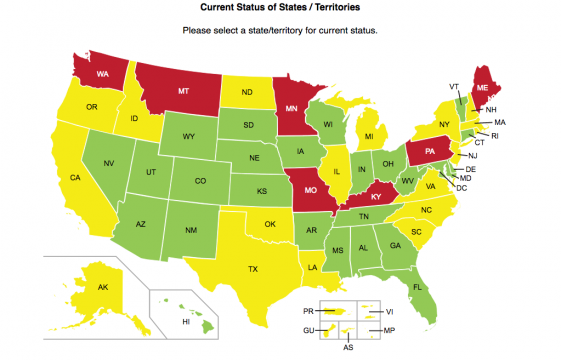JEFFERSON CITY, Mo. – With the deadline looming, Missouri lawmakers have renewed their push to get Real ID in the Show-Me State.
Legislation to seeking to comply with the federal standard for identification was heard by the Senate Committee on Veterans and Military Affairs on Thursday morning, as well as two other bills.
Both Sens. Ryan Silvey, R-Kansas City, and Caleb Rowden, R-Columbia, filed bills this session to implement Real ID. In Thursday’s hearing, the pair presented their identical bills before the committee at the same time.
Following the aftermath of 9/11, the federal government decided that all states should have similar requirements for their identification purposes, which led to the Real ID Act in 2005. Currently, 43 states have accepted and implemented the standard, with just seven states dissenting.

Both senators argued that it’s necessary for Missouri to work toward becoming a state that uses Real ID before the January 2018 deadline.
“In January of 2018, the federal government will no longer accept Missouri driver’s licenses as valid identification to fly on federally-regulated aircraft,” Silvey said. “That means that everyone who goes to KCI, or to Lambert, even if they’re flying from Kansas City to St. Louis and not leaving the state, they will not be allowed on the airplane unless they bring a passport or some other federally-regulated form of identification. I think that would be a ridiculous burden to put on our public, and also will cost them a lot of money.”
Representatives from both KCI and St. Louis’ Lambert airport spoke before the committee, saying that enacting Real ID would not only address the issue of identification, but it would also prevent any loss in traffic. Both representatives cited increased traffic in recent years and said that the non-compliance could not decrease traffic which hcould have a negative effect on the state’s economy.
Rowden pointed out another issue with Missouri’s lack of federally-recognized identification, noting that it’s required for military base access.
Sen. Dan Brown agreed, noting that even something as simple as attending the military graduation ceremonies could be an issue without the proper identification.
“If the goal is to make Missouri military family-friendly, I think this certainly is a step in the right direction,” Silvey responded.
Under the proposed bills, the state would enact a two-pronged system, which would offer both the Real ID option and a non-compliant option, allowing for people to choose. Under this system, people wishing to not have their required documents retained by the department could choose to receive a non-compliant ID.

“I think this is the way that makes the most sense because it allows for the personal freedom of opting out,” Silvey said. “If you don’t like it, then don’t do it. But don’t keep me from doing it just because you don’t like it.”
Silvey said it would actually be cheaper to offer that two-pronged system than to solely use the Real ID option, as less data would potentially have to be retained if people choose the non-compliant option.
The Department of Revenue has estimated that it would take two years to get the program up to date and in place, but Silvey says that won’t be an issue.
“Homeland Security assured us that states that are moving to compliance will be granted extensions to implement the program,” he said.
The committee also heard two other bills on Thursday.
Sen. Will Kraus, R-Lee’s Summit, spoke before the committee on his proposed legislation that seeks to waive business fees for military spouses and veterans, saying this would address the need to better provide for military families.
Sen. Gary Romine, R-Ste. Genevieve, also addressed the committee on SB 108, which would grant reemployment rights to Missouri employees who are members of the National Guard in other states and are called on active duty.
Romine’s bill would protect the Missouri employee, guaranteeing them reemployment rights upon their return. Romine also asked that reservists be added to the bill.
Both received the support of the military persons in attendance, including the Missouri Association of Veterans Organizations (MAVO).
The chairman of the committee, Sen. Wayne Wallingford, R- Cape Girardeau, says he expects to bring the bills up in executive session next week.
Benjamin Peters was a reporter for The Missouri Times and Missouri Times Magazine and also produced the #MoLeg Podcast. He joined The Missouri Times in 2016 after working as a sports editor and TV news producer in mid-Missouri. Benjamin is a graduate of Missouri State University in Springfield.














